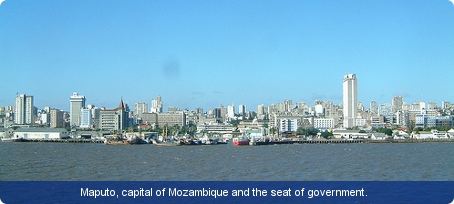Government
- Overview
- History

Mozambique is a republic and a multiparty democracy. It has an executive president as head of state and government, who is directly elected for a five-year term and serves a maximum of two terms. He or she appoints the prime minister and Council of Ministers.
The national legislature is the 250-member unicameral parliament (Assembléia da República), members of which are elected every five years by direct universal suffrage.
There are 11 provinces headed by a president-appointed governor and indirectly elected local assemblies. Each province is subdivided into districts.
The 1990 constitution, which replaced the independence constitution, separated the powers of the executive, the legislature and the judiciary. It enshrined the principles of political pluralism and election by a secret ballot of a government based on majority rule. It avowed the right to live in a ‘balanced environment’ and established the framework for a liberal market economy and the private ownership of land. It also abolished the death penalty.
A new constitution was adopted in 2004 and came into force in 2005. A Constitutional Council was established in 2005 to ensure strict observance of the new constitution including the electoral acts and also established the Council of State to advise the president on specific matters. The ombudsman ensures protection of the rights of the citizen. The new constitution emphasises that its interpretation should always be consistent with the Universal Declaration of Human Rights.
The Supreme Court is the final appellate court, and it has original jurisdiction in the most serious criminal cases. As well as other judicial courts, there are the Administrative Court, the courts-martial, and customs, maritime and labour courts. Some Supreme Court judges are appointed by the president and others are elected by parliament.

Mozambique, having been a colony of Portugal for almost five centuries, became independent in 1975. Some 90% of Portuguese settlers soon left the country.
The national flag of Mozambique received official recognition in 1983. It depicts a modern rifle (an AK-47), together with a hoe, an open book and a yellow star.
Nationalist groups, such as the Frente de Libertacáo de Mocambique (Frelimo), started to form in the 1960s. In 1975 Frelimo, under Samora Machel, the country’s first president, came to power with strong socialist ideals and the aim of rapid development.
Civil war broke out in the late 1970s between the government and Resistência Nacional Mocambicana (Renamo). The new constitution adopted in 1990 paved the way for the peace process; a peace agreement was made in October 1992. In the multiparty elections of 1994 Joaquim Chissano of Frelimo was re-elected as president with 53% of the votes, and Frelimo won the largest number of seats in the National Assembly.
In 1995 Mozambique became a member of the Commonwealth, the first member not to have been associated with the British Empire.
Chissano and his party won the presidential and general elections in 1999. Chissano announced in mid-2001 that he would not stand for a third term, and in 2002 Frelimo selected Armando Guebuza as its new leader and presidential candidate. He went on to win the 2004 presidential election, though there were fears (expressed strongly by Renamo) that the elections had been fraudulent. In October 2009 Guebuza and Frelimo were returned to power.





